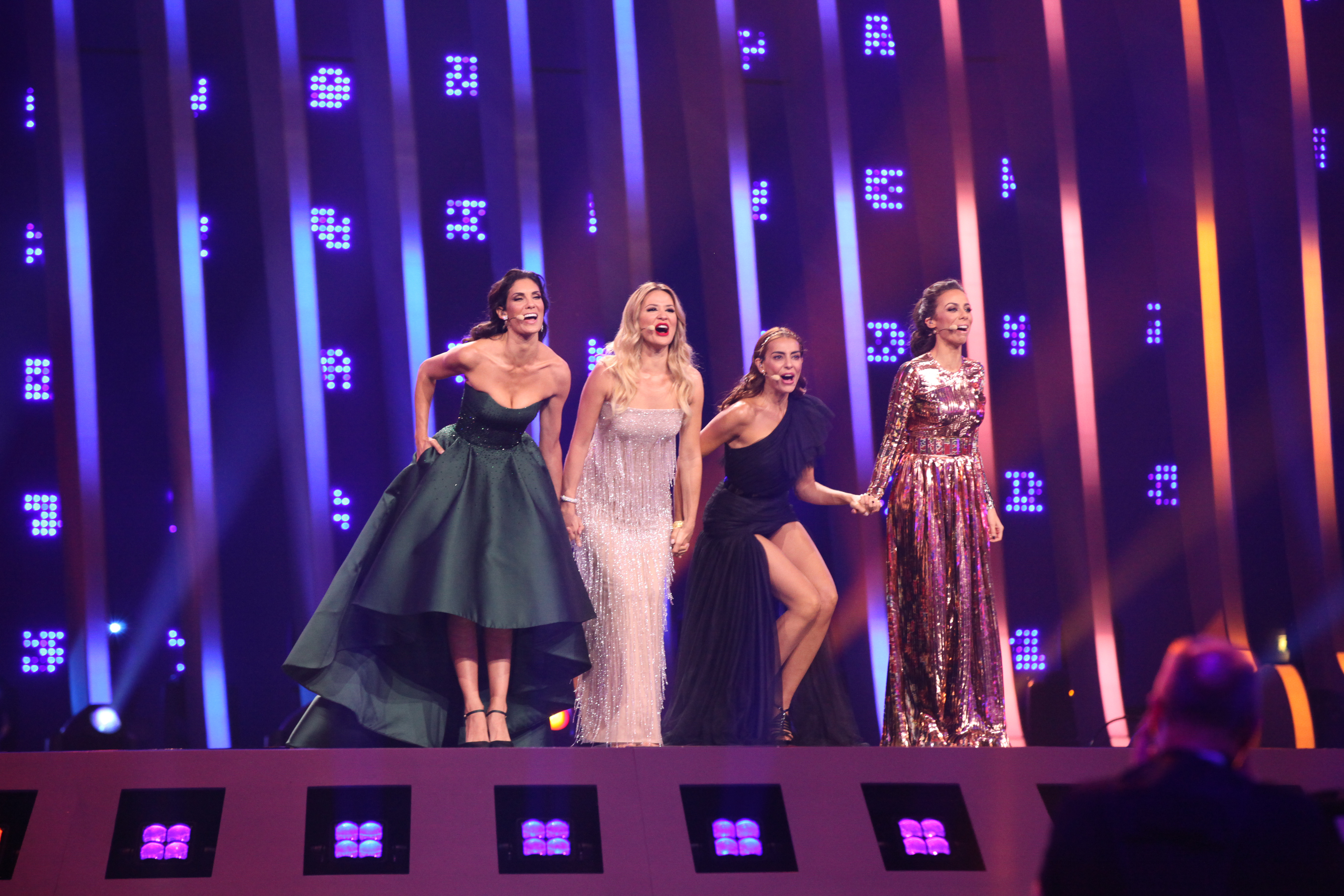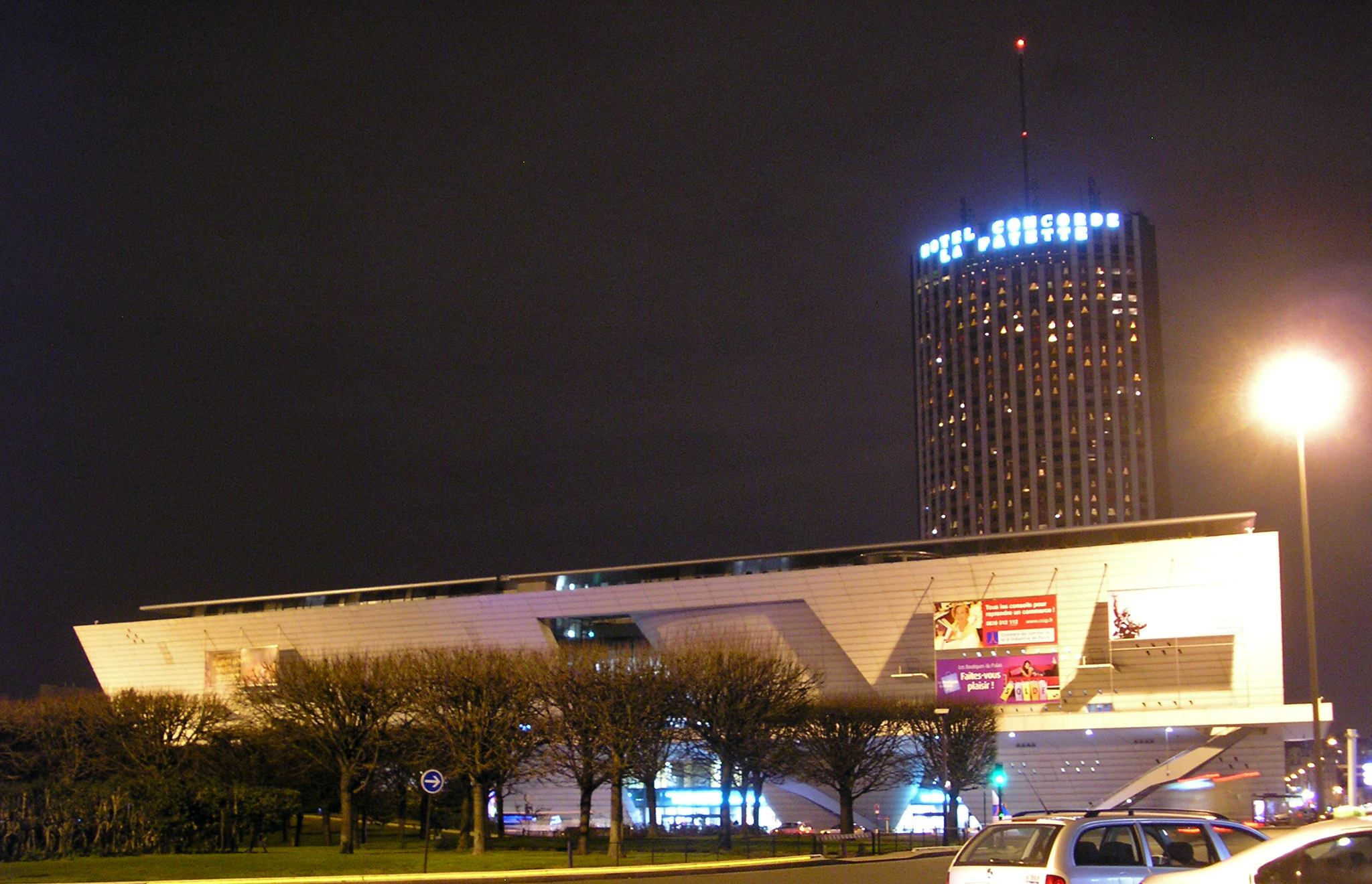|
Manuela Bravo
Maria Manuela de Oliveira Moreira Bravo, known as Manuela Bravo (born 7 December 1957) is a Portuguese singer. Bravo made her first public appearance when she was only 5 years old in Cinema ûden, in Lisbon (which is now closed). When she was 15 years old, she released her first single with two songs composed by Josûˋ Cid, "Nova GeraûÏûÈo" and "Another Time", where she appeared with the band Quarteto 1111. In 1975, Bravo released a new single, with arrangements and orchestrations by Jorge Palma, being the two songs "TûÙnhamos Vinte Anos" and "Soldado-Escravo" (the last entitled the single) composed by Tozûˋ Brito. In 1979 Manuela Bravo won the Festival da CanûÏûÈo with the song " Sobe, sobe, balûÈo sobe", composed by Nû°brega e Sousa, and represented Portugal in the Eurovision Song Contest 1979. She ended the contest in 9th place. Her father Loubet Bravo (1910 ã 1978), was a Coimbra fado Coimbra Fado (Portuguese: ''Fado de Coimbra'') is a genre of fado originating ... [...More Info...] [...Related Items...] OR: [Wikipedia] [Google] [Baidu] |
Manuela Bravo 2015
Manuela may refer to: People * Manuela (given name), a Spanish and Portuguese feminine given name * Manuela (singer) (1943ã2001), German singer of Schlager songs Film and television * ''Manuela'' (1957 film), a British film directed by Guy Hamilton * ''Manuela'' (1967 film), a Cuban short film directed by Humberto SolûÀs * ''Manuela'' (1976 film), a Spanish film directed by Gonzalo GarcûÙa Pelayo * ''Manuela'' (2006 film), a film directed by Marco Castro * ''Manuela'' (TV series), a 1991 telenovela starring Grecia Colmenares Grecia Dolores Colmenares Mieussens (born December 7, 1962 in Valencia, Venezuela) is a Venezuelan actress. Biography Grecia Dolores Colmenares Mieussens was born on December 7, 1962, in Valencia, Venezuela. She is the daughter of a Venezue ... Music * "Manuela" (Demis Roussos song), 1974 * "Manuela", a song by Julio Iglesias from '' A flor de piel'', 1974 {{disambiguation ja:ÐÐдÐˋ pl:Manuela ... [...More Info...] [...Related Items...] OR: [Wikipedia] [Google] [Baidu] |
Coimbra Fado
Coimbra Fado (Portuguese: ''Fado de Coimbra'') is a genre of fado originating in the city of Coimbra, Portugal. While adopted by students at the University of Coimbra, and sometimes known as Student Fado (''Fado de Estudante''), it is usually considered the typical music of Coimbra itself. Developed from the Iberian lyric style of trovadorismo popular during the Middle Ages, the genre shares roots with Occitan troubadors. Performed with the traditional ''Guitarra de Coimbra'' (a kind of Portuguese guitar originating in Coimbra), a modified version of Lisbon's fado guitar allegedly created by Artur Paredes, it is usually accompanied by classic acoustic guitar and male voices. Guitarists Artur Paredes and his son Carlos Paredes are considered the pioneers and masters of this musical genre. Among its most renowned singers were Edmundo Bettencourt and Antû°nio Menano, in the 1930s and 1940s, and Josûˋ Afonso, Adriano Correia de Oliveira, LuûÙs Goes and JoûÈo Maria Tudela, in ... [...More Info...] [...Related Items...] OR: [Wikipedia] [Google] [Baidu] |
People From Queluz, Portugal
A person (plural, : people) is a being that has certain capacities or attributes such as reason, morality, consciousness or self-consciousness, and being a part of a culturally established form of social relations such as kinship, ownership of property, or legal obligation, legal responsibility. The defining features of personhood and, consequently, what makes a person count as a person, differ widely among cultures and contexts. In addition to the question of personhood, of what makes a being count as a person to begin with, there are further questions about personal identity and self: both about what makes any particular person that particular person instead of another, and about what makes a person at one time the same person as they were or will be at another time despite any intervening changes. The plural form "people" is often used to refer to an entire nation or ethnic group (as in "a people"), and this was the original meaning of the word; it subsequently acquired its us ... [...More Info...] [...Related Items...] OR: [Wikipedia] [Google] [Baidu] |
Living People
Related categories * :Year of birth missing (living people) / :Year of birth unknown * :Date of birth missing (living people) / :Date of birth unknown * :Place of birth missing (living people) / :Place of birth unknown * :Year of death missing / :Year of death unknown * :Date of death missing / :Date of death unknown * :Place of death missing / :Place of death unknown * :Missing middle or first names See also * :Dead people * :Template:L, which generates this category or death years, and birth year and sort keys. : {{DEFAULTSORT:Living people 21st-century people People by status ... [...More Info...] [...Related Items...] OR: [Wikipedia] [Google] [Baidu] |
1957 Births
1957 ( MCMLVII) was a common year starting on Tuesday of the Gregorian calendar, the 1957th year of the Common Era (CE) and ''Anno Domini'' (AD) designations, the 957th year of the 2nd millennium, the 57th year of the 20th century, and the 8th year of the 1950s decade. Events January * January 1 ã The Saarland joins West Germany. * January 3 ã Hamilton Watch Company introduces the first electric watch. * January 5 ã South African player Russell Endean becomes the first batsman to be dismissed for having ''handled the ball'', in Test cricket. * January 9 ã British Prime Minister Anthony Eden resigns. * January 10 ã Harold Macmillan becomes Prime Minister of the United Kingdom. * January 11 ã The African Convention is founded in Dakar. * January 14 ã Kripalu Maharaj is named fifth Jagadguru (world teacher), after giving seven days of speeches before 500 Hindu scholars. * January 15 ã The film ''Throne of Blood'', Akira Kurosawa's reworking of '' Ma ... [...More Info...] [...Related Items...] OR: [Wikipedia] [Google] [Baidu] |
Um Grande, Grande Amor
UM or um may refer to: Universities * U of M (other) or UM, abbreviation for various universities Businesses * Universal McCann, a global advertising and media agency * United Motors Company, a former name of American automotive parts supplier ACDelco * Air Zimbabwe (IATA code UM) Science and technology * .um, the Top-Level Domain for United States Minor Outlying Islands * Um interface, the air interface for the GSM mobile telephone standard * Micrometre (ö¥m), sometimes written as "um" in limited character sets * Unified Model, a global numerical weather prediction model * Ultrarapid metabolizer, a term used in pharmacogenomics to refer to individuals with substantially increased metabolic activity * User manual, a document or manual intended to give assistance to people using a particular system * Utilization management, the evaluation of the appropriateness, medical need and efficiency of health care Other uses * Um (Korean surname) * "Um", an exclamation or filler ... [...More Info...] [...Related Items...] OR: [Wikipedia] [Google] [Baidu] |
Portugal In The Eurovision Song Contest
Portugal has participated in the Eurovision Song Contest 53 times since its debut at the 1964 contest. Since then it has missed five contests (, , , and ). The contest is broadcast in Portugal by RûÀdio e TelevisûÈo de Portugal (RTP). Portugal won the contest for the first time in and hosted the contest in Lisbon. Portugal finished last on its debut in 1964 and again in , before achieving its best result of the 20th century in , with Lû¤cia Moniz finishing sixth. The country then finished last for the third time in . Having not appeared in the final since and as holders of the record for most appearances in the contest without a win, Portugal won at the 49th attempt, when Salvador Sobral won the 2017 contest with the song "", Portugal's first top-five result in the contest. As hosts in 2018, the country finished last in the contest for a fourth time. History Portugal's debut entry was Antû°nio CalvûÀrio with "". It was not a successful debut for the country, with CalvûÀrio ... [...More Info...] [...Related Items...] OR: [Wikipedia] [Google] [Baidu] |
Dai Li Dou
The Eurovision Song Contest 1978 was the 23rd edition of the annual Eurovision Song Contest. It took place in Paris, France, following the country's victory at the with the song " L'Oiseau et l'Enfant" by Marie Myriam. Organised by the European Broadcasting Union (EBU) and host broadcaster Tûˋlûˋvision FranûÏaise 1 (TF1), the contest was held at the Palais des Congrû´s on 22 April 1978 and was hosted by French television presenters Denise Fabre and Lûˋon Zitrone. This was the first time that more than one presenter had hosted the contest as well as the first to have a male presenter since . In addition to hosting, the two presenters also served as commentators for France. Twenty countries participated, the highest number of competing countries in the history of the competition at the time. and both returned to the contest. Denmark had not participated since , 12 years before. The winner of the contest was with the song "A-Ba-Ni-Bi" by Izhar Cohen & the Alphabeta. Although ' ... [...More Info...] [...Related Items...] OR: [Wikipedia] [Google] [Baidu] |
Gemini (Portuguese Band)
Gemini was a Portuguese band from the 1970s. The members were Fatima Padinha, Teresa Miguel, Tozûˋ Brito and Mike Sergeant. In 1977 they participated in the Portuguese national final in order to represent the country in the Eurovision Song Contest with the song "Portugal no coraûÏûÈo". The song won. However, every song was sung by two performers, and the audience preferred Os Amigos over Gemini. Toze Brito and Mike Sergeant had previously been in the grupo Quarteto IIII in the Portuguese National Finals. They won the national final in 1978 with the song "Dai li dou". However, they only reached the 17th position. Teresa and Fatima would represent Portugal once more in 1982 in the band Doce Doce was a Portuguese female band from the 1980s. It was one of the first girl bands in Europe. The girls took part in the Portuguese national final in order to represent the country in the Eurovision Song Contest 1980 with the song "Doce" ("S .... Discography LPS *Pensando em Ti (LP, 1 ... [...More Info...] [...Related Items...] OR: [Wikipedia] [Google] [Baidu] |
Loubet Bravo , a coast in Antarctica
*a Brazilian singer
{{disamb ...
Loubet may refer to: *a former village, now part of Villeneuve-Loubet, Alpes-Maritimes, France * Alexandre Loubet (born 1994), French politician *ûmile Loubet, politician, 8th president of France *Loubet Coast Loubet Coast is the portion of the west coast of Graham Land in Antarctic Peninsula, extending 158 km between Cape Bellue to the northeast and Bourgeois Fjord to the southwest. South of Loubet Coast is Falliû´res Coast, north is Graham Coast. ... [...More Info...] [...Related Items...] OR: [Wikipedia] [Google] [Baidu] |
Lisbon
Lisbon (; pt, Lisboa ) is the capital and largest city of Portugal, with an estimated population of 544,851 within its administrative limits in an area of 100.05 km2. Grande Lisboa, Lisbon's urban area extends beyond the city's administrative limits with a population of around 2.7 million people, being the List of urban areas of the European Union, 11th-most populous urban area in the European Union.Demographia: World Urban Areas - demographia.com, 06.2021 About 3 million people live in the Lisbon metropolitan area, making it the third largest metropolitan area in the Iberian Peninsula, after Madrid and Barcelona. It represents approximately 27% of the country's population. [...More Info...] [...Related Items...] OR: [Wikipedia] [Google] [Baidu] |


_1938.jpg)


